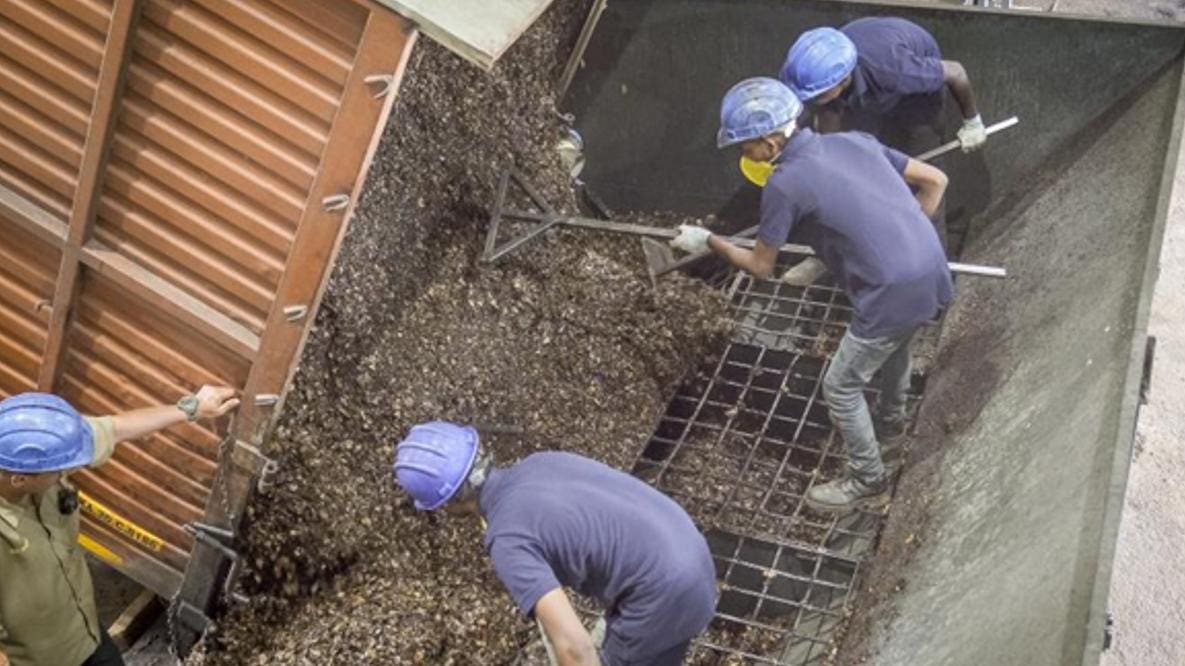Workers loading agricultural residue into a MASH Makes pyrolysis unit in Maharashtra, India. The waste is broken down into carbon molecules which can be refined into fuel.
MASH Makes
“Water, water, every where,
Nor any drop to drink.”
This line from Samuel Taylor Coleridge’s Rime of the Ancient Mariner expresses my frustration at the enormous wealth of above-ground carbon that goes to waste even while we dig up ancient fossil carbon to use for fuel.
“Mining” this above-ground carbon to manufacture biofuels would help mitigate the massive imbalance in the earth’s carbon cycle, and this column has highlighted a few startups doing just this. Kore Infrastructure is converting vegetation cleared from electrical transmission lines in California into hydrogen, and W2E Renewables is converting manure from Colorado dairy farms into natural gas.
Biofuel manufacturing technologies
Pyrolysis heats organic waste at or above 500°C in the absence of oxygen, breaking down waste molecules and concentrating the resulting compounds into fuel.
The products of pyrolysis are biochar, the carbon skeleton of the organic matter, gases such as carbon monoxide, hydrogen, and methane, and liquids that, if not condensed into a biofuel, form a sticky tar that can foul equipment.
Thermal gasification is a more involved process that heats organic waste to even higher temperatures, completely splitting molecules apart and creating just gaseous fuel and biochar.
The Viking, a pilot biomass gasifier at the Technical University of Denmark, sets the global benchmark for thermal gasification. The Viking is very efficient at converting biomass to fuel, requiring only about one-tenth of the energy it creates to run—compared to around one-third for other gasifiers—and produces very little tar.
A biofuel Viking in India
MASH Makes is an Indian and Danish startup working on commercializing the intellectual property underlying the Viking’s exceptional efficiency. MASH is an acronym composed of the founders’ initials, and Makes reflects the expansion of their product line beyond biofuels.
MASH Makes has established a network of waste biomass collection facilities in India. Each facility has a pyrolysis reactor based on the Viking design that converts agricultural residues such as cashew hulls from area farms into biofuels and high-quality carbon credits for sale on international markets. The biochar byproduct is sold to local farmers for use as a soil amendment.
I spoke with co-founder and CEO, Jakob Andersen, PhD, about MASH Makes’ commercial strategy. Andersen says that only about 5% of revenues come from biochar sales, but that these sales are the secret sauce powering the enterprise.
Adding porous biochar to soil helps fields retain water, enhancing crops’ resiliency to drought. The char also provides a structure for a complex ecosystem of helpful bacteria and other organisms that boost crop yields and can act as a catalyst that makes essential nutrients like nitrogen and potassium more available to plants. “By adding char to fields, we are increasing the amount of feedstock to go into our pyrolysis units. The ‘return on [agricultural] residues’ is amazing.” says Andersen.
The remainder of the startup’s revenue is evenly split between biofuels, which are shipped in tanks to local ports where they enter the global fuel market, and carbon credits purchased by prestigious buyers such as Microsoft and Stripe.
Funding biofuel production sites
Like other bioreactor businesses such as LanzaTech, MASH Makes relies on the strategy of “numbering up” rather than “scaling up”—coordinating a network of small producers rather than centralizing production in one massive plant.
MASH Makes funds each production site separately with outcome bonds issued by the World Bank, which align financial returns with measurable social and environmental impacts. Andersen told me the company is in the process of raising from $300 million to $400 million for its next 10 facilities through this financial vehicle.
The MASH Makes facility in Maharashtra, India. The rainbow behind the facility is an actual rainbow, not the “rainbow” of gaseous fuels that can be produced by the pyrolysis plant.
MASH Makes
At present, the company’s reactors create a “rainbow” of gaseous and liquid fuels through pyrolysis. When I asked how the company was handling the tar created in the process, Andersen said the company had worked on converting this usually unwanted byproduct into a carbon-negative marine fuel, and announced in April that a global shipping firm had combined MASH Makes biofuel with conventional marine fuels to power the auxiliary engines of a ship on its Brazil to Singapore route.
The company is in the process of raising a second round of venture capital to build out its Viking-based gasification units, using its first gasifier, housed in a 20-foot container, as a pilot. Andersen says that a 40-foot container unit will be ready to roll out commercially in the next few years, enabling the company to accept a wider range of organic feedstock and create even higher-quality fuel.
Refined cashew shells are an unlikely fuel source for a cargo ship, but MASH Makes has proven that it can be done. Out-of-the-box biofuel solutions like this one can help correct our planet’s massive carbon cycle imbalance before it’s too late. Intelligent investors take note.









